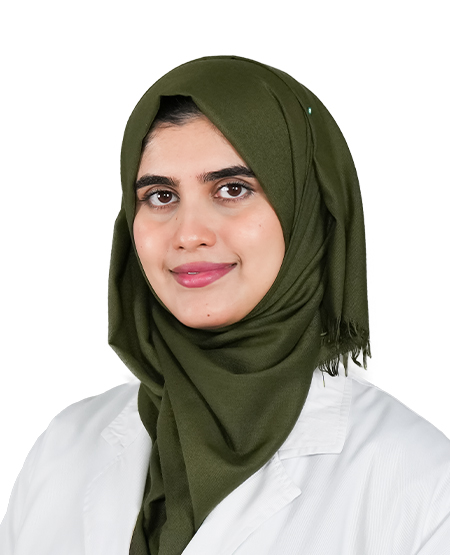 8+ years of exp
8+ years of exp
Languages
English, Urdu, Hindi and Basic ArabicClinics
Festival City Day Surgery Center
Home › Neurological Rehabilitation

Neurological rehabilitation is a specialized branch of physiotherapy focused on helping patients recover from neurological conditions – those affecting the brain, spinal cord, or peripheral nerves. These conditions often lead to challenges with movement, sensation, balance, or coordination. At our physiotherapy department in Dubai, we provide comprehensive neurological rehabilitation services to restore these functions and improve our patients’ quality of life. With an expert team and advanced therapy techniques, we help individuals relearn skills, strengthen their bodies, and regain independence in daily activities.
Our experienced therapists use gentle manual therapy to release fascial restrictions, addressing the root causes of pain. Myofascial Release helps you move more freely and live pain-free. Whether dealing with postural strain or a long-term condition like fibromyalgia, our Myofascial Release therapy in Dubai provides relief and renewed flexibility.
Neurological rehabilitation (often called neuro rehab) is designed for adults who have experienced neurological injuries or disorders. Whether someone is recovering from a stroke or coping with a nerve injury, neuro rehab offers a pathway to maximize recovery. Our Dubai clinic’s approach is holistic and patient-centered – we don’t just address isolated symptoms, but treat the whole person. This means developing strength and mobility, retraining the nervous system, and boosting confidence. Through tailored exercises and one-on-one guidance, patients can overcome limitations, adapt to any lasting impairments, and achieve the highest possible level of function. Progress may be gradual, but with consistent therapy and support, patients often make remarkable improvements in mobility and daily living skills.
In our Neurological Rehabilitation program in Dubai, highly trained physiotherapists use proven techniques to facilitate nervous system recovery. Each treatment plan is customized to the individual’s needs, drawing from a range of specialized therapies. Depending on your condition, your rehabilitation may include:
By combining these techniques, our neurological rehabilitation team addresses the diverse challenges that come with neurological disorders. Every therapy is chosen to target specific goals – be it improving a patient’s arm function so they can dress themselves, or increasing leg strength and balance. Throughout the process, we closely monitor progress and adjust therapies to ensure optimal outcomes.
Our physiotherapy department in Dubai provides neuro-rehabilitation for a wide range of conditions affecting the nervous system. We focus primarily on adult patients with neurological issues, helping them regain function and independence. Conditions we commonly treat include:
In addition to the above, our clinic is equipped to manage many other neurological and neuromuscular conditions. We understand that every patient’s condition is unique, and we tailor our treatment approach accordingly. If you or your loved one is dealing with a neurological issue not explicitly listed here (such as Parkinson’s disease, multiple sclerosis, or others), our team will still be able to assess and create an appropriate rehabilitation plan or refer you to the relevant specialist. Ultimately, our Neurological Rehabilitation in Dubai covers a broad spectrum of conditions, ensuring comprehensive care for our community.
Neurological rehabilitation can be life-changing. By investing in a structured rehab program, many patients see significant improvements in muscle strength, movement, balance, and task ability. Confidence and independence grow alongside physical abilities. Our department has countless success stories of patients regaining mobility and reclaiming their lives.
If you or a family member faces challenges from a stroke, nerve injury, or any neurological condition, remember that you are not alone. Advances in rehabilitation and our team’s expertise mean the brain and nerves can relearn and heal, even months or years after an injury. We are here to guide you with personalized care.


Neurological rehabilitation is therapy for those with neurological conditions like stroke, brain or spinal cord injuries, Parkinson’s disease, multiple sclerosis, or cerebral palsy. It involves personalized exercises to improve movement, balance, coordination, and strength. Both children and adults with neurological impairments can benefit, with programs tailored to their unique needs and goals at our Dubai clinic.
The timeline varies. Some patients see small improvements within a few sessions, while others may require months or years. Significant progress often occurs within the first 3–6 months post-injury due to neuroplasticity. Continued therapy can lead to further gains. Patience and persistence are key to meaningful improvements in function and quality of life.
Neurological rehab aims to maximize recovery, but full recovery depends on factors like the severity of the injury, overall health, and the intensity of rehab. Some patients, especially with milder conditions, may achieve near-complete recovery, while others might improve significantly but not fully return to pre-injury function. Rehab can still provide substantial benefits, teaching compensatory strategies to enhance day-to-day life. Though we can’t guarantee 100% recovery, our programs in Dubai are designed to help each patient reach their optimal potential.
Without rehabilitation, someone with a neurological condition may lose more function and independence. Muscles can weaken or tighten from disuse, and joints may stiffen, potentially leading to immobility even if nerve signals improve. Lack of activity can also cause secondary complications like pressure sores or poor circulation. Additionally, the absence of guidance and improvement can negatively impact mental health, leading to depression or isolation. Skipping rehab can result in a lower level of recovery, while therapy opens opportunities for better function and quality of life.
Don’t let a neurological condition hold you back from living life to the fullest. Take the first step toward your recovery by scheduling a consultation with our neurological rehabilitation team in Dubai today.
 8+ years of exp
8+ years of exp
Festival City Day Surgery Center